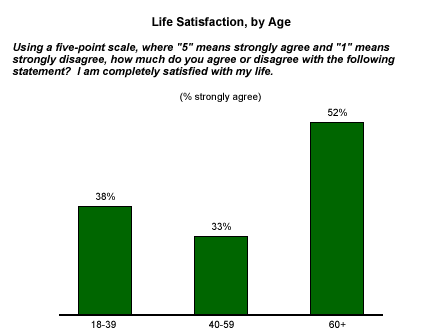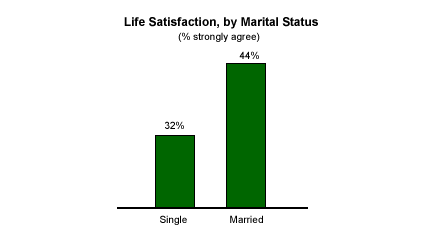The Rolling Stones' classic lament notwithstanding, satisfaction is largely a state of mind. But Gallup data indicate that Americans in some demographic categories consistently tend to be more content than others. Overall, in a recent poll about life satisfaction*, just 40% of respondents said they strongly agree with the statement, "I am completely satisfied with my life."
The poll was conducted in November and December 2002, as part of Gallup's research into life in faith communities. The sample was drawn randomly from the U.S. adult population, and the final data consists of 1,000 members of faith congregations and 500 non-members, roughly the proportion of members to non-members found in the United States. As a result, the data can be considered representative of the U.S. adult population at large.
Retirees More Satisfied
Naturally, people of different ages want different things out of life. A date for Saturday night and an "A" on the physics midterm can often make a college student's life complete. But at 45, satisfaction may be more a function of health, family, and work. Still, the Americans most likely to strongly agree that they are "completely satisfied" are those older than 60, who have probably experienced and accomplished more than their younger counterparts and now have more time for reflection.

Is It a Money Thing?
Perhaps the most obvious place to look for life satisfaction differences is among different income levels. The age-old question of whether money can buy happiness meets with mixed results in recent studies: according to the faith communities poll, 34% of those with an annual household income of $60,000 and over strongly agree that they are completely satisfied with their lives, but so do 39% of those with incomes between $30,000 and $60,000, and 42% of those with incomes of $30,000 or less.
On the other hand, a January Gallup Poll on the mood of the nation found that income did appear to make a difference. When respondents were asked whether they were satisfied or dissatisfied with their personal lives, 78% of those with household incomes of less than $30,000 said they are satisfied, compared to 86% of those with incomes of $30,000 to $50,000 and 91% of those with incomes of $50,000 or more.
Happily Married?
Being married seems to improve one's chances for contentment. Married people are significantly more likely to strongly agree that they are completely satisfied than those who are single, 44% versus 32%.

This is a finding that has been echoed in other recent studies. In their 2002 report, The State of Our Unions, authors David Popenoe and Barbara Dafoe Whitehead put it this way, "Marriage … contributes to the physical, emotional and economic health of men, women and children, and thus to the nation as a whole. It is also one of the most highly prized of all human relationships and a central life goal of most Americans."
Spiritual Satisfaction
Although the main goal of religion may not be to satisfy earthly desires, people who had been to church recently were slightly more likely to say they are satisfied than those who had not. Forty-five percent of respondents who attended worship services in the last week are completely satisfied with their lives, compared with 36% of those who had not attended worship services in the last week.
Bottom Line
A sense of belonging, whether to a spouse or to a faith community -- or perhaps both -- appears to encourage life satisfaction. Al Winseman, Gallup's Global Practice Leader for Faith Communities, notes that, "An important indicator of belonging is friendship. As social creatures, human beings need quality relationships. Members of congregations in which relationships are a priority have a stronger sense of belonging -- especially when those members have what they would consider to be best friends." (See "Meeting Members' Needs: Do I Belong?" in Related Items.)
*Results are based on telephone interviews with 1,000 adult members of a church, synagogue, or other religious faith community, aged 18 and older, and 500 non-members, conducted in November and December 2002. For results based on this sample, one can say with 95% confidence that the margin of sampling error is ±2.6%.
